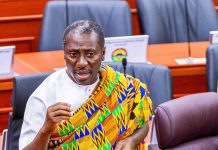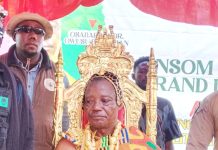A former Presiding Member of the Kumasi Metropolitan Assembly (KMA) and a local government practitioner has accused the Local Government Ministry and Parliament of subverting local government laws with impunity.
Speaking in an interview with The Chronicle, Nana Kofi Senyah noted that the Local Government ministry is being killed under the watch of the sector minister and legislators.
The former Ashanti Regional chairman of Presiding Members Association noted that after practicing local governance and decentralisation in Ghana for 31 years, it was expected that major strides would have been made in the area of social accountability and development.
He blamed the current situation on the ministry of local government and legislators for not having contributed enough to the development of local governance and decentralisation at the grassroots.
According to Nana Senyah, the framers of the 1992 constitution of the Republic of Ghana and the Local Government Act 462 of 1993, as amended were so magnanimous to Ghanaians by providing clauses that will deepen democracy, decentralisation, holistic development and social accountability, through which the people shall govern themselves through the structures at the sub national government level, without or with less political interference.
He, however, noted that in the recent past, spanning the period from 1997 to 2020, known events unfolding in local governance leave much to be desired.
The former National President of Presiding Members Association bemoaned the alarming rate at which the local government system and decentralisation are folding up at the whims and caprices of the local government ministry and the legislators.
He referred to the admission of Prof. Kwamena Ahwoi, whilst addressing a workshop on the District Assembly Common Fund in 2012 in Accra that, “the future of the MPs Common fund I think is in doubt,” since the “MPs Common fund was most likely unconstitutional”.
Mr. Ahwoi had reportedly explained that, the decision to allocate part of the fund to MPs in 1997 was as a result of demands from MPs as a form of financial assistance to undertake developmental projects in the face of DCEs who bluffed the MPs in need of financial support from the Assemblies.
Nana Senyah also reported that Prof. Ahwoi had further explained that “Owusu Acheampong, then NDC Majority leader and J.H. Mensah, then NPP minority leader, requested that part of the DACF be given to the Legislators because DCEs were bluffing with the fund, as a condition for MPs to approve the formula for the sharing of the fund.
Even when Prof. Ahwoi reportedly insisted that allocating part of the DACF to MPs would be unconstitutional they (legislators) insisted because they also needed to do some projects in their constituencies.
This development, according to the former New Suame Assembly member “is the beginning of usurpation of power and resources from the MMDAs”.
He said there is no constitutional provision for MPs common fund and referred to Article 252, clauses 2 and 5, which mandate parliament to allocate funds not less than 5% to the MMDAs, as well as prescribing the functions and tenure of the common fund administrator.
In spite of these provisions, Nana Senyah said Legislators have now become agents for development in their various districts and by so doing have disenfranchised the MMDAs and for that matter the assembly members.
Referring to Article 240 (2) and sub-clauses (a,b,c,d) Nana Senyah said the Legislators are behaving contrary to the constitutional provisions, which mandate them to enact appropriate laws to ensure that functions, powers, responsibilities and resources are at all times transferred from the central government to the local government units, as well as ensuring probity, transparency and accountability at the MMDAs.
As a result, local government system or the MMDAs find themselves broke, as some of their corporate characteristics have been compromised by the local government ministry and the law makers.
Nana Senyah also cited instances which led to the breakdown of the local government system.
He said President Kufuor in his eight year term had to dissolve the MMDAs in 2006, while President Mills and President John Mahama had to dissolve the MMDAs in 2010, with President Akufo-Addo also dissolving the MMDAs in 2019 for obvious reasons.
The local government expert said all these happened under the auspices of the Local government ministry as it failed to ensure strict adherence of the laws of the assemblies for proper regulations of the MMDAs.
He pointed to Section 4 (1) of the Local Government Act 936 which enjoins the MMDAs to be a corporate body and a perpetual succession in its existence and Article 113 (2) which mandates Parliament to review their term of office not to exceed one year.
The MMDAS as a lower legislators or parliament could have extended their term to ensure proper implementation of section 4 (1) of the Local Government Act 936 yetthe Ministry of Local Government has sat aloof for far too long without ensuring that the Assembly members (chairman and leaders) become more effective and efficient in the act of ensuring legality and social accountability within the various MMDAs as the laws and legal regimes have stimulated.
Nana Senyah also mentioned situations where the Ministry of Local Government manipulates the election of the executives and President of National Association of Local Authorities of Ghana (NALAG), which is supposed to be the sole mouthpiece of the MDMAs, thus making NALAG insensitive to the plight of assembly members over the years.
NALAG, he said, has become a forum for partisan politics, just like the Council of State who are elected by the assembly members in a non partisanship fora but become partisan in practice and neglect the functions and roles they owe the assembly members and the Districts.
According to Nana Senyah, the local government system is structured in a manner that the assembly member must always be the centre of every policy and decision making in the MMDAs, hence the deliberations, legislative and executive functions hover around him or her.
He buttressed this position with section 6 (3) which states that “whenever a situation arises in which the Electoral Commission is unable to conduct a District level election, the president may appoint an interim management committee to perform the functions of the assembly until elections are conducted “.
Nana Senyah also explained that as vague as this law sounds or seems, it is always superior to convention, yet the Local Government ministry has time and time again used convention and their authority to circumvent the law at their whims and caprices.
In most cases revenues are not accounted for in the interim, audit reports are not presented to the legislators on assumption.
“The seemingly collaboration by ministry of local government and the MMDCs are further weakening the local government system”, he said.
He further said the Local government minister is mandated to develop model standing orders for the MMDAs under Section 18 (6) of the Local Government Act 936 of 2016 and that the act of modifications and amendments reside with the various MMDAS, Section 17 (7) of the local government Act 936 (2016) yet the Local government ministry over the years had made amendments in the standing orders already adopted and approved by the various MMDAs.
This has undermined the authority and the integrity of the various MMDAs because most of the functions of the General Assembly are being displaced and placed under the authority of the MMDCEs, which is in total contradiction with the laws and regulations of the MDMAs, citing an instance where the ministry has replaced Order 66 (2) of the existing Standing Orders with order 65 (2).
Nana Senyah noted that Presiding members are the head of the assembly and are positioned to authenticate the common seal which actually binds the MMDAs with other entities they seem to be not in control if affairs.
“Do Presiding members no longer authenticate the By-Laws, minutes of meetings, Budgets, Fee fixing resolutions and other formal documents that bind the MMDAs?”, he queried.
Nana Senyah has, therefore, called on the government to, as a matter of urgency, organise workshops for local government personnel to rectify prevailing anomalies without any further delay to ensure a formidable Local Government system.









